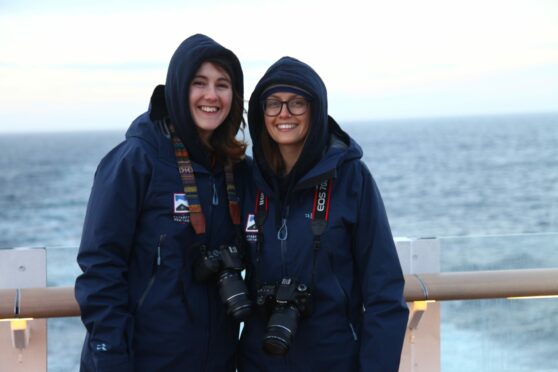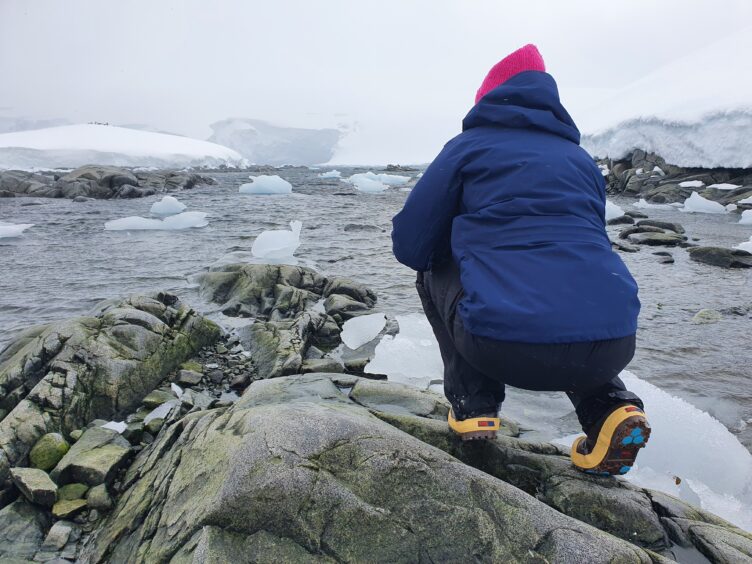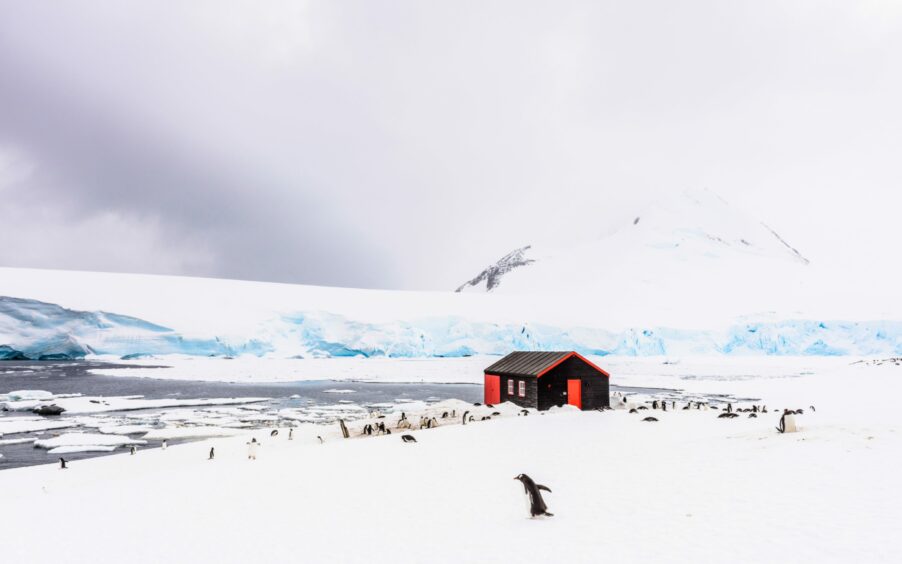
While many of us will have rung in the New Year toasting with friends down the local or snuggled on the sofa with family and a glass of fizz, Mairi Hilton’s Hogmanay was a little different.
She celebrated the bells with a small group of colleagues and 1,500 Gentoo penguins on a tiny island in the middle of the Antarctic Ocean with no running water, basic food supplies and no wifi.
Yet scientist Hilton, from Bo’ness, can’t think of anywhere she would rather start the New Year than in Port Lockroy on Goudier Island, where she is also one of five women running the UK’s most southerly mailroom – the Penguin Post Office. The popular site reopened last October after being closed since 2020 due to the pandemic.
“I’m a conservation biologist and I still can’t believe I’m working in Antarctica surveying penguins. It’s something I dreamed of but never thought would actually happen. It’s incredible,” said Hilton, 30.
Waking to a morning cacophony of penguin cheeps and chatter and looking out across majestic glaciers and snow-topped peaks has been a unique experience. “It is so beautiful here,” added Hilton of Port Lockroy, the main harbour on the island that lies west of the Antarctic Peninsula and 9,000 miles south of the UK.
“Any direction you look in is the most spectacular view imaginable as it’s surrounded by towering, jagged mountains and glaciers. The island itself is small, but there’s no sense of claustrophobia with the vast scale of the surrounding landscape.”
Managed by the UK Antarctica Heritage Trust, the Penguin Post Office, gift shop and museum is housed in the former research site Base A and allows tourists from visiting cruise ships to send a postcard to anywhere in the world. The distinctive black and red building contrasts spectacularly against its snowy setting and is often surrounded by local nesting penguins.
Today, Port Lockroy is a popular tourist destination yet, for over a century, it has been a home for explorers, whalers, scientists, and sailors who have made vital contributions to Antarctic history and whose work is celebrated in the Penguin Post Office’s small museum.
Following in their footsteps is the experience of a lifetime for Hilton and her colleagues, selected from 6,000 applicants to manage the Penguin Post Office during the Antarctic summer from October to March, when they will be visited by 18,000 tourists.
Thousands of cards are posted from Port Lockroy each year to more than 100 countries. Once stamped and packaged, the post is sent by cruise ship to Stanley Post Office on the Falkland Islands where it enters the UK mail system, taking from three to six weeks to reach its destination. “We can welcome two ships a day, so running the shop, post office and museum takes up most of our time,” said Hilton.
“We cancel [hand-stamp] the mail, and do all of the general tasks required to run the base – digging the landing site to provide safe access, organising visits, sorting waste, data entry and health and safety checks. We don’t have much free time, but our days off have been spent exploring the island, practising our photography, playing board games and catching up on reading.”
The conservation biologist, who previously joined wildlife research expeditions in the Peruvian Amazon and Trinidad and Tobago, is also the island’s wildlife monitor. Hilton keeps count of the Gentoo penguin population and monitors hatchlings and nests to determine the breeding success. This continues the UK Antarctica Heritage Trust’s 20-year study into the success of 500 breeding pairs of penguins on the island and the impact of climate change.
“The late heavy snowfall has been challenging,” said Hilton, who has spent the last four years completing a PhD in conservation biology in Australia before recently moving to New Zealand. “It initially took up a lot of our time digging, but has also made the penguin survey challenging. Every time it snowed the penguins would have to restart their nests, so counting the nests has been difficult.”
South Georgia on our mind: Intrepid duo on helping reopen an island museum on the edge of the world
As a conservationist, climate change is forever on Hilton’s mind and she is witnessing first hand the impact it has on Antarctica’s wildlife.
“This year there has been an unusually late, heavy snowfall. Gentoo nests are usually made of pebbles, but instead this year they were initially just hollows in the snow. The eggs have a better chance of survival when laid in pebble nests,” she said. “We’re starting to see more melt now, but it’s been a tricky start to the season for our penguins. They are relatively long-lived, so the odd bad year of breeding isn’t a huge concern, but if we start seeing more years like this in the future it may be cause for concern.”
Luckily, despite the remoteness, Hilton and her colleagues – postmaster Clare Ballantyne from Lincolnshire, shop manager Natalie Corbett from Hampshire, base leader Lucy Bruzzone, from London, and assistant Vicky Inglis, from Aberdeenshire – have been able to piggyback on to visiting cruise ships’ wifi to keep in touch with family and friends.“We can send emails to keep in touch with home, and we’ve been able to make a few calls home, so we have been keeping in touch quite frequently,” said Hilton.
Like Hogmanay, Christmas Day on Goudier Island was a quiet affair that involved a rare and welcome lie-in and, said Hilton, “lots of cooking, listening to Christmas songs and a walk down to the shore at low tide. That’s a new favourite pastime as not only do you see new things but you also get to walk on rock rather than snow, which is quite a novelty at the moment”.

Enjoy the convenience of having The Sunday Post delivered as a digital ePaper straight to your smartphone, tablet or computer.
Subscribe for only £5.49 a month and enjoy all the benefits of the printed paper as a digital replica.
Subscribe
 © Shutterstock / Anton_Ivanov
© Shutterstock / Anton_Ivanov